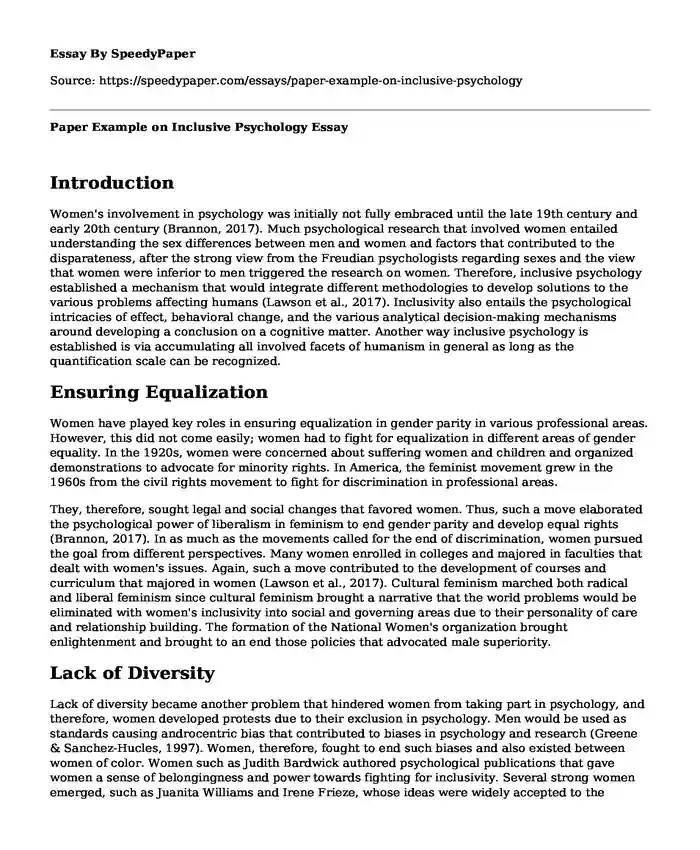
| Type of paper: | Essay |
| Categories: | Women Psychology |
| Pages: | 3 |
| Wordcount: | 631 words |
Introduction
Women's involvement in psychology was initially not fully embraced until the late 19th century and early 20th century (Brannon, 2017). Much psychological research that involved women entailed understanding the sex differences between men and women and factors that contributed to the disparateness, after the strong view from the Freudian psychologists regarding sexes and the view that women were inferior to men triggered the research on women. Therefore, inclusive psychology established a mechanism that would integrate different methodologies to develop solutions to the various problems affecting humans (Lawson et al., 2017). Inclusivity also entails the psychological intricacies of effect, behavioral change, and the various analytical decision-making mechanisms around developing a conclusion on a cognitive matter. Another way inclusive psychology is established is via accumulating all involved facets of humanism in general as long as the quantification scale can be recognized.
Ensuring Equalization
Women have played key roles in ensuring equalization in gender parity in various professional areas. However, this did not come easily; women had to fight for equalization in different areas of gender equality. In the 1920s, women were concerned about suffering women and children and organized demonstrations to advocate for minority rights. In America, the feminist movement grew in the 1960s from the civil rights movement to fight for discrimination in professional areas.
They, therefore, sought legal and social changes that favored women. Thus, such a move elaborated the psychological power of liberalism in feminism to end gender parity and develop equal rights (Brannon, 2017). In as much as the movements called for the end of discrimination, women pursued the goal from different perspectives. Many women enrolled in colleges and majored in faculties that dealt with women's issues. Again, such a move contributed to the development of courses and curriculum that majored in women (Lawson et al., 2017). Cultural feminism marched both radical and liberal feminism since cultural feminism brought a narrative that the world problems would be eliminated with women's inclusivity into social and governing areas due to their personality of care and relationship building. The formation of the National Women's organization brought enlightenment and brought to an end those policies that advocated male superiority.
Lack of Diversity
Lack of diversity became another problem that hindered women from taking part in psychology, and therefore, women developed protests due to their exclusion in psychology. Men would be used as standards causing androcentric bias that contributed to biases in psychology and research (Greene & Sanchez-Hucles, 1997). Women, therefore, fought to end such biases and also existed between women of color. Women such as Judith Bardwick authored psychological publications that gave women a sense of belongingness and power towards fighting for inclusivity. Several strong women emerged, such as Juanita Williams and Irene Frieze, whose ideas were widely accepted to the psychology career (Brannon, 2017). The psychology profession covered different social areas such as women biases, gender inequality studies, sexism, child development, discrimination in work areas, and housewives' idea. Today, women's capabilities and abilities are witnessed in different professions like in medical sectors where their expertise and cognition are highly utilized in solving human problems.
Conclusion
In conclusion, women's contribution to psychology has developed and contributed to new ways concerning traditional psychology in both social and professional areas. The changes are still happening. Some women's movements continue advocating for more changes that would enhance psychology and create an environment that embraces women's ideas in solving some life problems affecting humans.
References
Brannon, L. (2017). The Study of Gender. In Gender: psychological perspectives (Seventh, pp. 1–19). Allyn and Bacon.
Greene, B., & Sanchez-Hucles, J. (1997). Diversity: Advancing an inclusive feminist psychology. Shaping the Future of Feminist Psychology: Education, Research, and Practice., 173–202.
https://doi.org/10.1037/10245-008
Lawson, R. B., Anderson, E. D., & Cepeda-Benito, A. (2017). Women in the History of Psychology. A History of Psychology, 275–304.
https://doi.org/10.4324/9781315225432-14.
Cite this page
Paper Example on Inclusive Psychology. (2024, Jan 07). Retrieved from https://speedypaper.com/essays/paper-example-on-inclusive-psychology
Request Removal
If you are the original author of this essay and no longer wish to have it published on the SpeedyPaper website, please click below to request its removal:
- Decision Making Essay Samples
- Free Essay Sample on Stereotypes
- Strategy Definition Risks Value
- Free Essay Example - Human Resource Methods
- Essay Sample on Ericson's Research Paper
- Free Essay Example - Leaders and Followers
- Free Paper - Navigating Expectations: The Complex Realities Faced by Women in Their Late 30s
Popular categories




